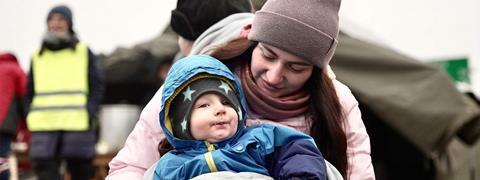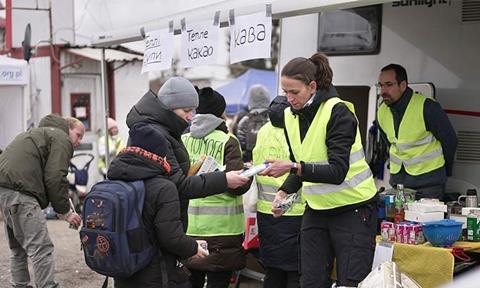As the human suffering in Ukraine continues to make headlines around the world, over two million people have now crossed into neighbouring Poland. Christians there are feeding and housing refugees and, more importantly, holding out hope to those fleeing unimaginable terror

All day long and late into the night, small groups of women and children, and a few men, make their way across the Ukrainian-Polish border. Clustered around their suitcases and with blankets wrapped tightly around their shoulders to keep warm, they seem to hurry towards a finish line.
“I’m not leaving for myself,” says Marina, a Ukrainian who has just arrived at the border. “I’m leaving for her.” She indicates her five-year-old daughter playing next to her. The pair left their home, near the Belarus border, at 5am, crossing into Poland around 10pm that night. Like many, their only thought was of getting to safety; fleeing the destruction and threat of bombs and missiles behind them.
“For over a week we lived in terror, mostly in the basement. I had to keep my daughter dressed all the time so she couldn’t sleep well. I was constantly listening and thinking we have to flee,” Marina shares. It was after an attack on a nearby nuclear plant that she finally made the decision to go. Just 26 years of age, she has left behind her husband, parents and relatives.
Rising tides
Over 2.3 million people have now left Ukraine for Poland. They are welcomed by volunteers who escort them across the border, carrying heavy suitcases and tired children to safety. The volunteers are mostly Polish, but some have come from countries further away, sensing that this is the time to help.
“Some Ukrainians have no place to go,” explains Weronika, Operation Mobilisation’s country leader in Poland. “The government arranges to pick up these people from the border [and take them] to a welcome centre where volunteers help them. Others have contacts elsewhere that they are travelling to but have a long journey yet ahead – and these are the people we can help.”
After the long, dangerous trip, the women and children arriving in Poland are exhausted, and need a place to rest and eat. The OM team have set up trailers at two border crossings, providing a safe, warm space for mothers and children. Marina was one of these.
His hands and feet

For Ukrainians travelling onward to cities where they have family, friends or contacts, many pass through Poland’s capital, Warsaw. Here, another OM team is working to connect Polish people offering accommodation to the arriving Ukrainians. The highest need is for housing, whether temporary or more permanent.
“There are many Polish people that want to help but need to be linked with the needs of the Ukrainians,” Weronika shared. “Part of our job has been to help connect them.”
A young volunteer team makes calls every day to arrange housing. Often, requests to accommodate a family of five or six new arrivals come in late at night. Hundreds of people have been housed through the network that OM has developed. Next, a website is being launched to make it even easier.
The time is now
In Kutno, a polish city with a large Ukrainian population, an OM church plant has become an organising centre for the community’s response to the needs of those arriving. With several Ukrainian church members, they are already welcoming the relatives and contacts of those living there. The church itself has been repurposed as a shelter, with people dropping off food, clothing and essentials for the refugees. People are also opening their homes, offering a spare apartment or even squeezing their family into one bedroom to free up another room for those in need.
For over a week we lived in terror, in the basement. I had to keep my daughter dressed all the time
“Now is the time to help,” says Donna who, along with her husband Arek, planted the church 22 years ago. She bustles around, coordinating and organising in the midst of the chaos. There are piles of donated clothing to be sorted, food shelves to be restocked and the constant arrival and departure of people.
Veronika, who spent a night in the church before being placed in her own apartment, left Ukraine with her mother, two-year-old daughter and 16-day-old baby boy. “What do you need in the apartment? Is anything missing?” Donna asks her during a visit. Despite working tirelessly for the previous eight days, Donna makes time for all of the women that arrive, offering them words of encouragement and helping them find what they need.
Everywhere, volunteers pitch in, working to house and feed people, provide transport from the border or to accommodation, and engaging in conversation with those who have just experienced the trauma of leaving so much behind. Those fleeing have left husbands, loved ones and homes – and the weight of these choices is visible on their faces. People’s practical needs are far easier to meet than the emotional scars they carry.
“They need more than a juice pack and some snacks – anyone can provide those,” Weronika explains. “But what they really need is peace, a conversation with someone, to be seen as a human and listened to.”
To find out more and give to the work of OM in Eastern Europe visit: www.uk.om.org/appeal/ukraine-in-crisis































